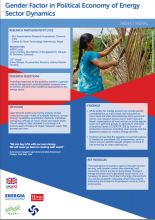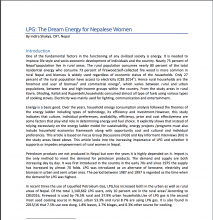
LPG: The Dream Energy for Nepalese Women
Indira Shakya
One of the fundamental factors in the functioning of any civilized society is energy. It is needed to improve life style and socio-economic development of individuals and the country. Nearly 75 percent of Nepal’spopulation live in rural areas. The rural population consumes nearly 80 percent of the total residential energy who consume 73 percent of firewood.Self-collected fire wood is more common in rural Nepal and biomass is widely used regardless of economic status of the households. Only 27 percent of the rural population have access to electricity (CBS 20141). Hence rural households are...
Read More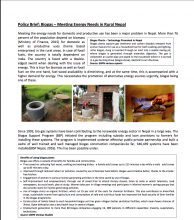
Policy Brief: Biogas – Meeting Energy Needs in Rural Nepal
Meeting the energy needs for domestic and productive use has been a major problem in Nepal. More than 76 percent of the population depend on biomass (Ministry of Finance, 2015) for domestic as well as productive uses (home based enterprises) in the rural areas. In case of fossil fuels, the country is totally dependent on India. The country is faced with a double‐ edged sword when dealing with the issue of energy. This is true for biomass as well as fossil fuel: on the one hand, fuel wood availability is diminishing, and at the same time, this is accompanied with a higher demand for energy...
Read More
The Value of Rural Women’s Labour in Production and Wood Fuel Use
Dev Nathan, Indira Shakya, R Rengalakshmi, Manjula M, Shantanu GaIkwad, Govind Kelkar
How do gender-related factors influence cooking fuel use? Why does an LPG capital subsidy lead to fuel stacking rather than fuel switching? The insights gained from authors’ research are supplemented by case studies, specifically aimed at exploring the connections between women’s labour time and fuel use. Using these observations and case studies, an analytical framework is developed, which yields propositions that can be tested empirically, such as the high value of women’s labour in production leading to the adoption of labour-saving cooking fuel and vice versa. This framework is used to...
Read More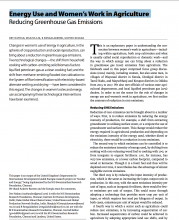
Energy Use and Women’s Work in Agriculture
Dev Nathan, Manjula M, R Rengalakshmi, Govind Kelkar
Changes in women’s use of energy in agriculture, in the spheres of crop production and social reproduction, can bring about a reduction in greenhouse gas emissions. Two technological changes—the shift from household cooking with carbon-emitting solid biomass fuels to liquified petroleum gas as a clean cooking fuel; and the shift from methane-emitting flooded rice cultivation to the System of Rice Intensification with electricity-based alternate wetting and drying—have been considered in this regard. The changes in women’s roles and energy use accompanying these technological interventions...
Read More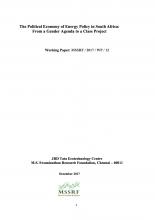
The Political Economy of Energy Policy in South Africa: From a Gender Agenda to a Class Project
Horman Chitonge
The paper begins with a profile of the energy sector, highlighting both the supply as well as demand sides, and focusing on the post-apartheid period. This is followed by a brief analysis of the development of the energy policy, including the main actors in its formulation. The next section looks at the four phases in the development of the energy policy from 1994 to the present. Following this is a brief discussion of how the South African energy policy is influenced by international factors and players, including international agreements on climate change and donors. A section on gender...
Read More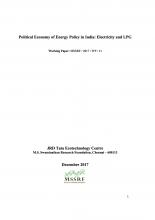
Political Economy of Energy Policy in India: Electricity and LPG
Haribandhu Panda
Clean energy is key to good quality life, effective production, productivity enhancement and innovation. India has abundant coal and renewable energy, matured technology and institutions for meeting the clean energy needs of lighting, cooking and other utilitarian and productive requirements. Over the years, the country’s energy consumption has become highly skewed towards fossil fuels. In addition to high-grade coal for steel and power production, India’s oil and natural gas needs are mostly met through import. Geographically, there is wide disparity in energy consumption, with some...
Read More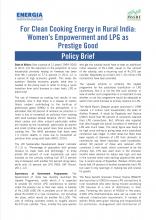
For Clean Cooking Energy in Rural India: Women’s Empowerment and LPG as Prestige Good
Over a period of 12 years (1999–2000 to 2011–12) the reduction in the proportion of rural households primarily relying on firewood has been from 86.1 percent to 77.2 percent in 2011–12 in a period of high economic growth. This raises the question: Besides economic growth, what else is needed at the policy level in order to bring a quick transition from solid biomass to clean fuels, LPG or electricity?The use of firewood as cooking fuel results in two problems. One is that there is a release of carbon (black carbon) contributing to the build-up of greenhouse gases (GHGs) in the atmosphere...
Read More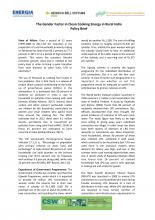
The Gender Factor in Clean Cooking Energy in Rural India Policy Brief
Govind Kelkar,Dev Nathan, Shantanu Gaikwad,Manjula M,R. Rengalakshmi
State of Affairs: Over a period of 12 years (1999-2000 to 2011-12) the reduction in the proportion of rural households primarily relying on firewood has been from 86.1 percent to 77.2 percent in 2011-12 in a period of high economic growth. This raises the question: Besides economic growth, what else is needed at the policy level in order to bring a quick transition from solid biomass to clean fuels, LPG or electricity?
The use of firewood as cooking fuel results in two problems. One is that there is a release of carbon (black carbon) contributing to the build-up of...
Read More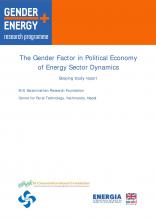
The Gender Factor in Political Economy of Energy Sector Dynamics
M.S. Swaminathan Research Foundation,Centre for Rural Technology, Kathmandu, Nepal
This research proposal is based on the premise that it is necessary to include gender concerns in the political economy of energy access. In addition to a structural analysis of power in conventional concerns of political economy, we underscore the need for a gender analysis of political and economic processes to understand the strategic energy needs of rural women and men, who have experienced marginalization and exclusion in the development of energy infrastructure. The central research question is: how can rural women be empowered to gain access to modern energy services in both...
Read More
